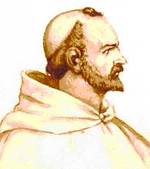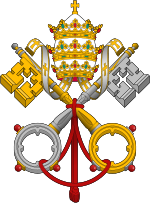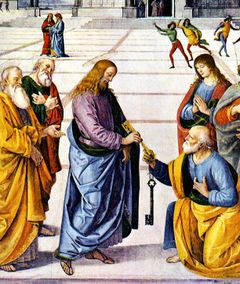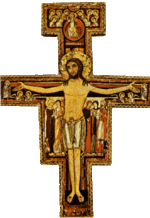Pope Lucius III
| Lucius III | |
|---|---|
 |
|
| Papacy began | September 1, 1181 |
| Papacy ended | November 25, 1185 |
| Predecessor | Alexander III |
| Successor | Urban III |
| Personal details | |
| Birth name | Ubaldo |
| Born | ca. 1100 Lucca, Italy, Holy Roman Empire |
| Died | November 25, 1185 Verona, Italy, Holy Roman Empire |
| Other Popes named Lucius | |
| Papal styles of Pope Lucius III |
|
|---|---|
 |
|
| Reference style | His Holiness |
| Spoken style | Your Holiness |
| Religious style | Holy Father |
| Posthumous style | None |
Pope Lucius III (ca. 1100 – November 25, 1185), born Ubaldo, was pope from September 1, 1181 to his death.
A native of the independent republic of Lucca, he was born ca. 1100 (1097?) as Ubaldo, son of Orlando. He is commonly referred to as a member of the aristocratic family of Allucingoli, but this is not proven[1]. He had close ties to the Cistercians, but it seems that he never joined this order[2]. He was named cardinal by Pope Innocent II in December 1138, initially as cardinal-deacon of San Adriano, then (May 1141) as cardinal-priest of Santa Prassede. Pope Adrian IV (1154–1159) promoted him to the rank of Cardinal Bishop of Ostia and Velletri in December 1158. He was dean of the Sacred College of Cardinals and one of the most influential cardinals under Pope Alexander III (1159–1181).
After being elected Pope, he lived at Rome from November 1181 to March 1182, but dissensions in the city compelled him to pass the remainder of his pontificate in exile, mainly at Velletri, Anagni and Verona.
He disputed with the Emperor Frederick I (1152–1190) the disposal of the territories of the late Countess Matilda of Tuscany. The controversy over the succession to the inheritance of the Countess had been left unsettled by the peace of 1177, and the Emperor proposed in 1182 that the Curia should renounce its claim, receiving in exchange two-tenths of the imperial income from Italy, one-tenth for the Pope and the other tenth for the cardinals. Lucius consented neither to this proposition nor to another compromise suggested by Frederick I the next year; nor did a personal discussion between the two potentates at Verona in October 1184, lead to any definite result.
Meantime other causes of disagreement appeared, in the Pope's refusal to comply with Frederick I's wishes as to the regulation of German episcopal elections which had taken place during the schism, and especially as to the contested election to the see of Treves in 1183.
In pursuance of his anti-imperial policy, he declined finally in 1185 to crown Henry VI (1190–1197) as Frederick I's destined successor, and the breach between the Empire and the Curia became wider on questions of Italian politics.
In November 1184 he held a synod at Verona which condemned the Cathars, Paterines, Waldensians and Arnoldists, and anathematized all those declared as heretics and their abettors. Contrary to what is often said, he did not institute the Inquisition, which was not created until the reign of Pope Gregory IX in 1234.
In 1185 preparations began for the Third Crusade in answer to the appeals of Baldwin IV of Jerusalem (1174–1185). Before they were completed, Lucius died in Verona.
References
- ↑ J. M. Brixius, Die Mitglieder des Kardinalkollegiums voin 1130-1181, Berlin 1912, p. 90
- ↑ S. Miranda: Cardinal Ubaldo Allucingoli (note 1); I. S. Robinson, The Papacy 1073–1198. Continuity and innovation, Cambridge University Press 1990, p. 212.
- Philippe Levillain, John W. O'Malley , The Papacy. An Encyclopedia, 2002
 This article incorporates text from a publication now in the public domain: Chisholm, Hugh, ed (1911). "Lucius". Encyclopædia Britannica (Eleventh ed.). Cambridge University Press. http://en.wikisource.org/wiki/1911_Encyclop%C3%A6dia_Britannica/Lucius.
This article incorporates text from a publication now in the public domain: Chisholm, Hugh, ed (1911). "Lucius". Encyclopædia Britannica (Eleventh ed.). Cambridge University Press. http://en.wikisource.org/wiki/1911_Encyclop%C3%A6dia_Britannica/Lucius.- This article includes content derived from the Schaff-Herzog Encyclopedia of Religious Knowledge, 1914, which is in the public domain.
| Catholic Church titles | ||
|---|---|---|
| Preceded by Ugone |
Cardinal-bishop of Ostia 1158–1181 |
Succeeded by Thibaud of Ostia |
| Preceded by Alexander III |
Pope 1181–1185 |
Succeeded by Urban III |
|
|||||||||||||||||||||||||||||||||||||||||||||
|
|||||||||||||||||||||||||||||||||||||||||

